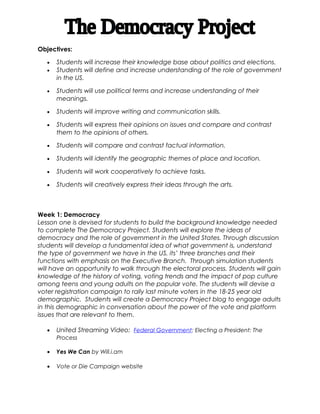Voting project
- 1. Objectives: • • Students will increase their knowledge base about politics and elections. Students will define and increase understanding of the role of government in the US. • Students will use political terms and increase understanding of their meanings. • Students will improve writing and communication skills. • Students will express their opinions on issues and compare and contrast them to the opinions of others. • Students will compare and contrast factual information. • Students will identify the geographic themes of place and location. • Students will work cooperatively to achieve tasks. • Students will creatively express their ideas through the arts. Week 1: Democracy Lesson one is devised for students to build the background knowledge needed to complete The Democracy Project. Students will explore the ideas of democracy and the role of government in the United States. Through discussion students will develop a fundamental idea of what government is, understand the type of government we have in the US, its’ three branches and their functions with emphasis on the Executive Branch. Through simulation students will have an opportunity to walk through the electoral process. Students will gain knowledge of the history of voting, voting trends and the impact of pop culture among teens and young adults on the popular vote. The students will devise a voter registration campaign to rally last minute voters in the 18-25 year old demographic. Students will create a Democracy Project blog to engage adults in this demographic in conversation about the power of the vote and platform issues that are relevant to them. • United Streaming Video: Federal Government: Electing a President: The Process • Yes We Can by Will.i.am • Vote or Die Campaign website
- 2. • Obama and Romney official websites Vocabulary: government, democracy, checks and balance, Executive Branch, Judicial Branch, and Legislative Branch, delegates, political party, democratic, republican, independents, liberals, electoral college, caucus, general election, national convention, demographic Week 2: Mission Democracy Students will utilize voters’ demographic trend information to brainstorm and determine best marketing strategy for voter registration campaign. Students will write letters or email local media outlets, campaign head quarters, civic groups, and community organizers etc. and utilize social media in support of the voters registration drive. Students will finalize preparations for the drive. Week 3: Democracy in Motion Students will follow-up with community vendors and supporters of the voter registration drive to ensure that all plans are executed prior to Friday or Saturday. Students will set up venue for drive and write thank you letters for all vendors and supporters. Students will blog about the experience. Week 4: Know the Issues Students have an opportunity to research and debate the platforms of each candidate in whole group discussion. Students will be randomly assigned to a political party to prepare for a mock debate on the main issues facing our economy and citizens. Week 5: Let’s Rap About It Students will continue to stay abreast of campaign reports and contribute to Democracy Project blog. Students will track Red and Blue states preliminary stats using a political map of United States. Students will have mock debate. Week 6: It’s Showtime! Students will continue to stay abreast of campaign reports and contribute to Democracy Project blog. Students will track Red and Blue states preliminary stats using a political map of United States. Each party will create an original video in support of their candidate to add to blog. Week 7: Democracy in Action Students’ blog will include information on where and how to vote. Students will help facilitate and participate in mock election held at S.T.A.R.S. Leadership Academy.
- 3. Week 8: Our New President is…. Students will blog about results of election and its’ impact on the next four years.


